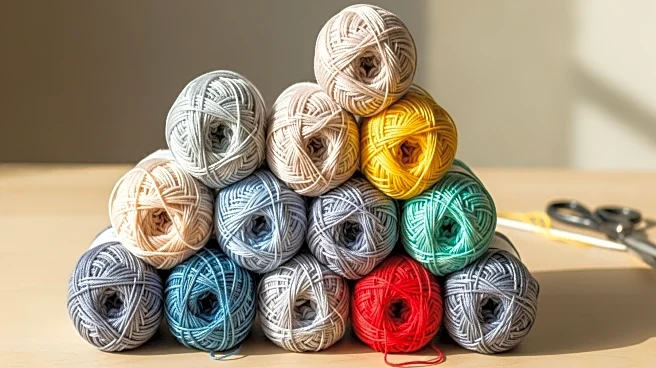What is the story about?
What's Happening?
New tariffs imposed by President Trump have disrupted the supply chain for yarn, affecting tens of millions of U.S. knitters and crocheters. These tariffs have removed duty-free status from low-value imports, making it financially unfeasible for international suppliers to continue providing yarn to the U.S. market. As a result, many international yarn brands have suspended U.S. shipping, leading to a shortage of diverse yarn types sourced globally. The crafting community is facing significant challenges, with many knitters unable to access their preferred materials. The tariffs aim to encourage local purchasing, but the U.S. lacks the infrastructure to meet the demand, with only a few mills remaining active.
Why It's Important?
The yarn shortage highlights the broader impact of trade policies on niche industries and hobbies. U.S. knitters, a major consumer bloc, are facing increased costs and limited access to materials, which could lead to a decline in the hobby's popularity. The shortage also affects small businesses and yarn stores, which rely on international supplies to meet customer demands. The crafting community's resilience is tested as they adapt to new conditions, potentially shifting towards less sustainable materials or reducing their engagement in the hobby. The situation underscores the interconnectedness of global trade and its effects on local economies and communities.
What's Next?
The crafting community may explore alternative solutions, such as sourcing yarn locally or repurposing existing materials. U.S. mills could potentially expand to meet demand, but this would require significant investment and time. The tariffs may lead to increased prices for consumers, prompting them to seek cost-effective options. The situation could drive innovation within the industry, as businesses and hobbyists adapt to new challenges. The crafting community's response will be crucial in determining the future of the hobby in the U.S.
Beyond the Headlines
The yarn shortage raises questions about the sustainability of trade policies and their impact on cultural and recreational activities. It highlights the need for balanced trade strategies that consider the diverse needs of consumers and industries. The situation may prompt discussions on the importance of preserving cultural hobbies and the role of government in supporting niche markets. The crafting community's response could influence future policy decisions and encourage a reevaluation of trade practices.














